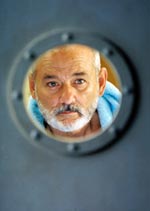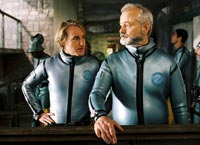You won’t find the word father on the résumé of Steve Zissou.
That’s because Zissou, an inventive seafaring documentarian, has been too caught up in his own self-perpetuating mythology to settle down and raise a family. But every dream has its price, and The Life Aquatic with Steve Zissou, director Wes Anderson’s latest melancho-medy, is the story of a visionary who must reckon with the temporality, and the cost, of his dreams. The ambitious captain of the Belafonte is clearly past his prime. Cracks are spreading through his reputation as a trustworthy scientist. He’s burdened by tragedy. And he’s struggling to maintain his few important relationships. Life is proving more difficult to “direct” than the movies he makes with his crew. He’ll either sink under the weight of life’s disappointments, or be lifted up by an unexpected blessing.

Played with typical devil-may-care detachment by Bill Murray, Zissou is a comical version of the popular 1970s explorer Jacques Cousteau. His films recount the adventures of his faithful crew, “Team Zissou,” as they examine new forms of sea life and hold forth about their discoveries, sporting the trademark Zissou style—Speedos and red stocking caps. As a result, they’ve enjoyed some celebrity … even some merchandising. There was once a line of Zissou adidas.
But Zissou’s audience is becoming suspicious that some aspects of his video chronicles are “faked.” When his latest installment premieres, documenting the death of his loyal sidekick Esteban (Anderson standby Seymour Cassell) in the jaws of the rare and dangerous Jaguar Shark, they’re skeptical. When he vows that his next chapter will be a revenge quest against the bloodthirsty beast, it sounds like the plan of a man losing his balance.
Ill-advised and ill-equipped, Zissou’s quest is interrupted by a crisis that brings out the best in him. After his ship is attacked by Filipino pirates, he musters the courage to attempt the rescue of a hostage crew member, postponing the inevitable face-off with that dastardly shark. He demonstrates some of the heroism he always hopes his films will capture.

There are other storms, however, that he’s not so prepared to endure. Off-camera, his marriage to the magisterial Eleanor (Anjelica Huston), “the brains” behind Team Zissou, is floundering. He’s jealous at the success of his competitor, wealthy seaman Allistair Hennessey (Jeff Goldblum), who may steal Eleanor’s affections. And he’s taken aback when a new volunteer—a Southern gentleman and Air Kentucky pilot named Ned Plimpton (Owen Wilson)—climbs aboard and announces that he may be Zissou’s son. The melancholy skipper retorts, “I hate fathers and I never wanted to be one.” Ultimately, his quest to get revenge (“Maybe with dynamite”) will lead him to realize that his glory days are past, his journey will be fraught with uncertainty and disappointment, and yet his efforts have not been entirely in vain. He was right all along to approach the world with enthusiasm and wonder.
Careening between comical capers and existential angst, Aquatic is Anderson’s most ambitious work to date. It’s set outside his natural habitat of meticulously designed interiors. And yet, each scene bears his unmistakable signature. It feels more “illustrated” than filmed, in a way that couldn’t be replicated by any other artist. Each of Aquatic’s exotic contexts is precariously balanced between complicated realism and inspired whimsy. In his cabin, Zissou struggles with the pressures of adulthood. But when he dives, we’re plunged into a cartoonish wonderland. Most of the creatures we see there—from a glow-in-the-dark shark to a Technicolor seahorse—were given life by Henry Selick, the master of stop animation who brought us The Nightmare Before Christmas.
Zissou’s passengers are just as colorful as the specimens he draws from the sea. He’s assembled a team of laborers who, while they lack “the background” to deserve such positions, flatter their captain’s ego and mirror his aimlessness. In return, they’re given a sense of purpose and identity.

None of them are more loyal than his jealous manservant Klaus (Willem Dafoe, playing against type). “Calm, collected, German,” Klaus runs Team Zissou’s cameras and tries to defend his position against any new threats. There’s a Pole (Noah Taylor), a Sikh, a topless “script girl,” and a group of unpaid student interns who are only slightly concerned that their pilot has no compass. Below the ship, two albino dolphins flit about with cameras strapped to their heads, intelligent enough to disobey every order. Above, Pelé dos Santos (City of God’s Seu Jorge) sits in the crow’s nest and strums solo arrangements of David Bowie songs, singing them in Portuguese. Why? It seems arbitrary at first, but the more we become acquainted with Steve’s restless spirit, the more these renditions of “Life on Mars?” and “Rebel Rebel” seem appropriate.
On this particular voyage, two wildcards have been added to the deck. An accountant “stooge” named Bill (Bud Cort) is along for the ride, reporting back to the expedition’s grouchy financier—Oseary Drakoulias (Michael Gambon). Cort’s presence is a brilliant bit of casting since he once starred in Harold and Maude, a uniquely subversive comedy that clearly influenced Anderson’s style. There’s also a beautiful and very pregnant journalist, Jane Winslett-Richardson (Cate Blanchett in another chameleonic transformation). Richardson is covering Zissou for Oceanographic Explorer, and she holds her cards close to her lifejacket, attending to the maverick sailor’s endeavors with an intensity that mystifies, arouses, and ultimately aggravates him. But he’s happy to have her along for the ride.
Zissou is even generous to his competitor, Hennessey, who has a bigger boat, better financing, and a crew of young men who look like they just walked out of an Abercrombie and Fitch catalogue. (Hennessey’s sexual orientation is as ambiguous as his qualifications for being a villain.) Zissou seems to believe that any great man must keep a good enemy around. “Be kind to Allistair,” he insists. “He’s my nemesis.”

The Belafonte is a character in itself. The camera pans along a fantastic cross-section, mapping each chamber so we can see the activity going on inside. The layout testifies to Zissou’s priorities. Where the Starship Enterprise is famous for its flight deck, sick bay, and engine rooms, the Belafonte seems built around a kitchen and a film-editing studio.
Torn between creative genius, quixotic madness, and relational incompetence, Steve Zissou is just the latest manifestation of the character that anchors all of Anderson’s films—the lost and mournful king who realizes his kingdom is slipping away. He’s a needy, sad individual who refuses to admit that he needs anybody, preferring to pretend he’s still in his prime. Bottle Rocket‘s Dignan seems paralyzed in a simplistic, childlike, overimaginative state of mind, inspiring both pity and nostalgia in the jaded grownups around him. Rushmore‘s Max refuses to graduate from his beloved high school, terrified of moving into adulthood where couldn’t be successful in everything. Tenenbaums‘ Royal has already lost his kingdom, and he fights to regain the days of a flourishing family, even though he’s single-handedly burned most of the bridges he needs to cross.
Just as Tenenbaum’s ruse about being on his deathbed is a feeble attempt to regain the love of his family, Zissou’s quest to kill that shark is a misguided way of lashing out at the forces that have wrested life’s steering wheel from his grasp. It becomes an opportunity to face his worst fear, and to realize that perhaps it is not to be feared at all, but to be humbly acknowledged and accepted, along with the grace offered along the way.
Anderson’s patient, studious fans know that there is much more to his characters than their quirks. As always, there are hints of a very human heart beating beneath all of Aquatic’s peculiar extravagance. That heartbeat is the relationship between Steve and Ned, characters united in loss. Just as Zissou mourned Esteban, so Ned misses his mother, a victim of ovarian cancer. They need each other. When the unmarried journalist touches her very pregnant belly and accidentally remarks “We’ve got to find a baby for this father,” there’s a wonderful irony in her misstatement.
But you may agree with critics like Roger Ebert, frustrated by the film’s abundance of frivolous details. It’s a valid complaint. Anderson seems averse to melodrama, and his movie is like Zissou himself—too caught up in distraction to dwell on deeper issues. He loves his characters’ idiosyncrasies and accessories, and this time he loves them to a fault, failing to inspire our emotions the way he engages the intellect. When a last-act tragedy occurs, it’s bewildering, almost incidental, rather than heartbreaking. Thus, Aquatic lacks the impact of its predecessors.
Nevertheless, this is a journey worth taking for its admirable focus on the value of family, and for the chance to meet more of the wonderful characters that populate the mysterious depths of Anderson’s imagination. Of his experimental expeditions, this is his first major navigational error. And while the movie never really arrives at anything fulfilling, the journey itself will stand as one of 2004’s most memorable, surprising films.
Talk About It
Discussion starters- What are Steve Zissou’s strengths? How does he demonstrate them? What are his weaknesses? What might he have done differently to keep his life in better shape?
- What are the priorities of his wife Eleanor? Why is she disillusioned with him?
- What do the characters on the Belafonte have in common?
- What differentiates Steve’s approach to his work from that of his nemesis, Allistair?
- What is the significance of the scene in which Steve confronts the shark? Why does he respond in the way that he does?
- What does the final sequence signify?
The Family Corner
For parents to considerThe Life Aquatic is whimsical entertainment for discerning grownups, but it is inappropriate for younger viewers. It is R-rated for language, some drug use, violence, and partial nudity.
What Other Critics Are Saying
compiled by Jeffrey Overstreetfrom Film Forum, 12/23/04In The Life Aquatic with Steve Zissou, Bill Murray goes to work once again with Wes Anderson, director of such eccentric favorites as Rushmore and The Royal Tenenbaums. This time, Murray has the lead role, playing the part of an oddball ship captain, a sort of comical cousin to Jacques Cousteau. Steve Zissou and his crew—Team Zissou—make documentaries of their voyages as they explore all manner of exotic sea life. But their cameras don’t pick up the deeper current of drama running through Zissou’s life: the disintegration of his marriage, the jealousy his nemesis provokes, and the regret and dismay he experiences when a volunteer on his crew announces that he may be Zissou’s son.
Anderson’s film once again balances heavy human drama with a world of frivolous and meticulous details. The result is amusing, melancholy, profound, and—unfortunately—unbalanced. Our storyteller becomes so obsessed with his large cast of characters and their various idiosyncrasies that he doesn’t allow us to become emotionally invested in the film. Thus, some of the film’s more tragic turns don’t carry the weight they should.
Still, the delightful performances of his stellar cast—which includes Owen Wilson, Cate Blanchett, Willem Dafoe, Angelica Houston, Jeff Goldblum, Bud Cort, Michael Gambon, and others—make this a worthwhile excursion for discerning adults.
My full review is at Christianity Today Movies.
David DiCerto (Catholic News Service) says the script is “as unwieldy as its title” and the film is “clever, but ultimately flat. This Melvillian revenge tale doesn’t have much wind in its sails. The film manages to stay afloat for the most part, thanks to the good performances from its talented cast.”
Brett McCracken (Relevant) says, “The Life Aquatic is the most ambitious film yet from director Wes Anderson—more visually rich, talent-full, expensive (there are explosions and pirate attacks!) than any of his previous films. But for all the craziness and ‘vintage Wes’ idiosyncrasy, Aquatic never quite reaches the heights it should. There are brilliant moments, especially in the third act, when the bittersweet tragedy of Bottle Rocket or Rushmore shines through grandly. But something—and I’m not quite sure what—is lacking here. It feels like Anderson has fallen in love with style (not a bad thing) and forsaken substance—at least the substantive kind of his earlier films.”
Some mainstream reviews are swept away on Anderson’s strange sense of comedy, but others can’t get past the frivolity to appreciate the deeper drama.
from Film Forum, 01/06/05Josh Hurst (Reveal) pens an open letter to director Wes Anderson. “I’m sure the critical backlash is painful. But be encouraged, Mr. Anderson; your critics are fools who will be proven wrong in due time. For my money, you’re the most imaginative and consistently fascinating director working today, and this new movie is your most daring and ambitious to date. You’d think critics would cut you some slack.”
from Film Forum, 01/13/05World Magazine writes, “Aquatic is a film to be enjoyed solely on the basis of its architecture. Every scene is intricately designed, framed, scored, and choreographed. Those who appreciate Mr. Anderson’s peculiar sensibility won’t be disappointed. But there’s no emotional, and, more importantly, no moral, center to the film.”
Copyright © 2004 Christianity Today. Click for reprint information.












